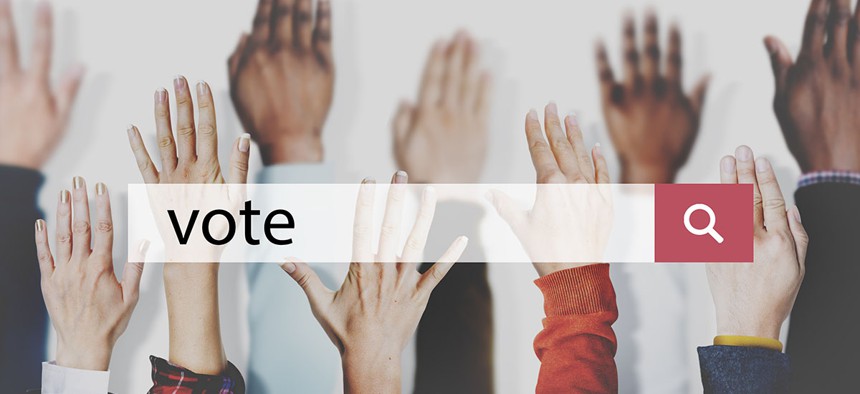Republicans To Pioneer Internet Presidential Voting Next Week

Rawpixel.com/Shutterstock.com
For the first time in America, Internet voting is being deployed as an option in a presidential contest.
John Breeden II is an award-winning journalist and reviewer with over 20 years of experience covering technology and government. He is currently the CEO of the Tech Writers Bureau, a group that creates technological thought leadership content for organizations of all sizes. Twitter: @LabGuys
On March 22, GOP voters in Utah will go to the polls to make their choice of presidential candidate. But whether they pick Donald Trump, Ted Cruz or John Kasich to be their standard-bearer is going to be historically less important than the process itself in that state.
For the first time in America, Internet voting is being deployed as an option in a presidential contest.
Last year, I wrote a column talking about places where Internet voting works, as it does in Estonia. I interviewed engineers from Smartmatic who deployed that technology there and in a few other countries. But even they thought it would be many years before the United States began to embrace the concept of voting over the Internet.
“We had been in talks with the GOP, and Utah is a very progressive state,” said Smartmatic program manager Mike Summers. “Their governor even visited Estonia to see how Internet voting worked there. But this effort came together fairly quickly over the past few months.”
The experiment with alternative voting technology could not come at a better time, according to a survey of 1,000 registered voters conducted by Smartmatic shortly before the primary season began. In that poll, the majority of respondents, a full 81 percent, said changes needed to be made to the U.S. voter experience and voting system. Perhaps Internet voting, if it can be done safely, would be the change that people desire.
How the process will work in Utah is that registered Republican voters can visit a portal and validate themselves using personal information like their name, address and date of birth. A unique PIN is then sent directly to their cellphone or email address, which can be used later to cast their ballot.
Voters can use their computers or their cellphone to access the site where the voting takes place. This can be done from anywhere. Voters can log in using their name and the unique PIN they received during the registration process.
Once verified, they are presented with their choices in a user interface designed for simplicity. Voters can also choose to navigate the voting process in English or Spanish.
“We wanted a very simple user experience, so when voters select their candidate, the other choices become unavailable, so you can’t make a mistake,” Summers said. “They can change their minds, but must first deselect their original choice, just to make it that much more accurate. Then they are shown their selections one last time and can verify everything before actually casting their ballot.”
On the backend, each vote is digitally signed and checked to make sure it corresponds to a registered voter, so no invalid votes can ever be added to the system. Each individual vote is encrypted and given a checksum value so later it can be confirmed that nothing was changed, deleted or otherwise manipulated.
And it’s not just GOP officials or the IT staff who can check the validity of votes. Once a vote is cast, each voter is given a digital token in the form of a PIN that allows them to track their ballot. After the election, a voter can use that PIN to confirm their vote was accepted by the system and properly counted, and was not changed or modified in any way.
“We think it’s important for the voter to be able to test the validity of their ballot themselves,” Summers said. “With an election, you need it to be both secure and transparent. Like Ronald Reagan used to say, ‘Trust, but verify.”
Smartmatic expects to process between 20,000 and 30,000 Internet votes in the Utah pilot program, but says that its system is designed to scale up as large as needed. Summers said he hopes to deploy Internet voting one day in a general election, so the pressure is on to ensure the Utah primary goes smoothly. He is confident it will based on its performance in other locations outside the US.
“We see this as a pivotal moment for voting technology in the United States,” Summers said. “Internet voting has never really caught on in this country, but the Utah primary will prove that we can build very secure yet transparent systems that are able to handle any task, even one as important as a presidential election.”






